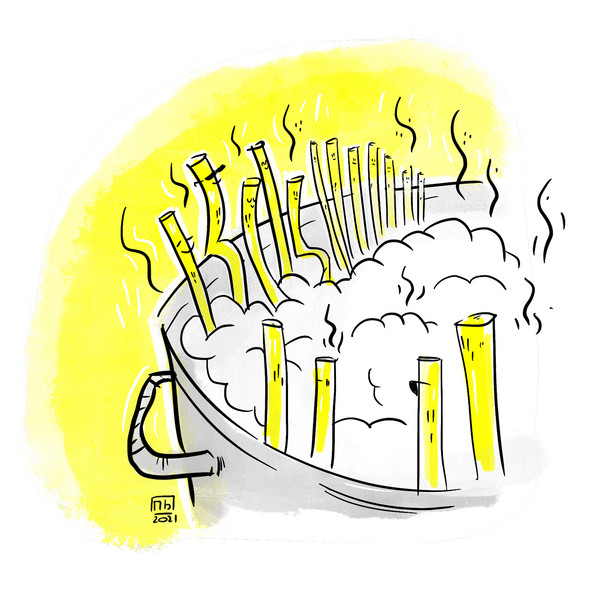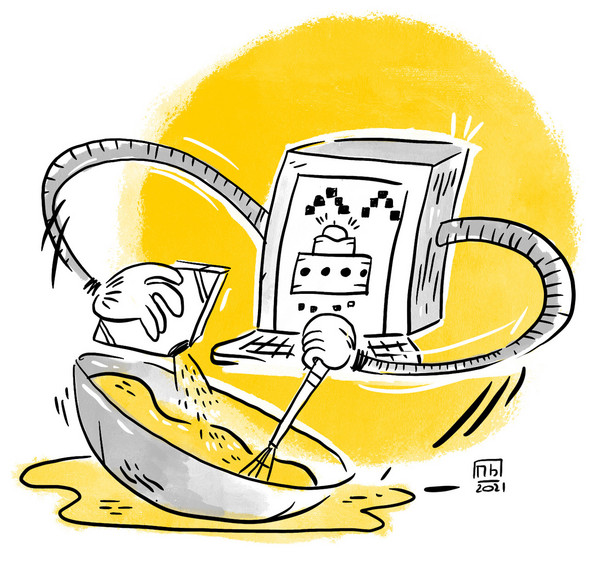Science only takes place in the laboratory? Surely not! You can also observe scientific phenomena in the kitchen, in the bathroom or in the supermarket. The Science Olympiad volunteers have collected some of these for you. But beware: a few statements are incorrect. Can you find them?
Quiz
1. The wind does not only blow in front of the front door or with the window wide open. Wind can also develop in closed rooms where there are no people.

That's correct!A thermal low pressure area can form above the heater because the air there is warmer than in the rest of the room. This can cause an air movement in the room.
Unfortunately, no! A thermal low pressure area can form above the heater because the air there is warmer than in the rest of the room. This can cause air movement in the room.
2. Your kitchen needs a makeover. You want to lay pentagonal tiles. You are spoiled for choice: mathematicians have discovered that there are at least 15 shapes of convex, pentagonal tiles that can be used to lay kitchen walls without gaps.
That's correct!In fact, this has long been an unsolved problem in mathematics. In 2015, Casey Mann, Jennifer McLoud Mann and David von Derau discovered the fifteenth type of pentagonal tile that can be laid to cover an area. By the way, there are infinite options for triangles and squares; with six or more corners it becomes difficult or even impossible.
Unfortunately, no! In fact, this has long been an unsolved problem in mathematics. In 2015, Casey Mann, Jennifer McLoud Mann and David von Derau discovered the fifteenth type of pentagonal tile that can be laid to cover an area. By the way, there are infinite options for triangles and squares; with six or more corners it becomes difficult or even impossible.
3. When cleaning up the kitchen, you not only notice that you need new tiles, but also that your silverware is tarnished and no longer shiny. Chemistry can help: The best way to clean cutlery is to wrap it in aluminum foil and soak it in a pan full of boiling water, salt and baking soda.
That's correct! This trick reduces silver sulphide back to silver.
Unfortunately, no! This trick reduces silver sulphide back to silver.
4. You hear on the news that an economic crisis is looming. The best thing you can do now is save all your money and spend as little as possible. You should rather postpone the planned kitchen renovation.
Unfortunately, no! Saving is not wrong in itself, but if everyone was only saving, the economy would crash much more rapidly because there is no money in circulation. People delay their purchase decision more and more and a negative spiral is created.
That's correct! Saving is not wrong in itself, but if everyone was only saving, the economy would crash much more rapidly because there is no money in circulation. People delay their purchase decision more and more and a negative spiral is created.
5. You went to the supermarket to buy spaghetti and ingredients for a cake. At the cash register you notice that on your way through the shelves you have once again put many products in the shopping cart that were not on your shopping list. You've fallen victim to a behavioral economics method called 'nudging' that makes you buy more. For example, products are placed at eye level or you are first guided through the entire store until you reach the cash register.

That's correct!
Unfortunately, no. That's incorrect!
6. When cooking spaghetti, it is better not to add salt until you eat it. This is because when you add salt to the cooking water, it lowers the boiling temperature, just as sprinkling salt in winter lowers the freezing temperature of the water on the streets. As a result, the water boils faster, but at lower temperatures. The spaghetti will be cooked worse that way.

Unfortunately, no! On the contrary, adding salt to the boiling water increases the boiling temperature. The boiling temperature is the temperature at which the water particles move so fast that they can break away from the compound of the liquid and fly away. The salt is dissolved in the liquid boiling water, there are attractive interactions between the salt ions and the water molecules. Therefore, a higher temperature must be reached until the water particles can free themselves from the compound. From an energy point of view, it therefore makes sense to salt the spaghetti later in the meal. This way, the additional energy that would have to be used to maintain the higher boiling temperature is not "lost".
That's correct!Adding salt to the boiling water increases the boiling temperature. The boiling temperature is the temperature at which the water particles move so fast that they can break away from the compound of the liquid and fly away. The salt is dissolved in the liquid boiling water, there are attractive interactions between the salt ions and the water molecules. Therefore, a higher temperature must be reached until the water particles can free themselves from the compound. From an energy point of view, it therefore makes sense to salt the spaghetti later in the meal. This way, the additional energy that would have to be used to maintain the higher boiling temperature is not "lost".
7. Boiling temperatures aside: maybe for culinary reasons it's better not to salt the spaghetti after cooking. If the cooking water is unsalted, the concentration of salt ions between the spaghetti and the water will not be balanced. To compensate for the concentration gradient, water particles migrate from the cooking water into the spaghetti. They make the spaghetti watery and tasteless.
That's correct! The process described is called osmosis and can actually take place in this way. Therefore, for a stronger taste, add the salt to the water before adding the spaghetti to the water. Additional tip: Although the salt should be added before the spaghetti, it is best to add it to the warm water first. This way it mixes quickly with the water. If the salt is added to cold water, it can accumulate at the bottom and cause salt stains in the pan.
Unfortunately, no! The process described is called osmosis and can actually take place in this way. Therefore, for a stronger taste, add the salt to the water before adding the spaghetti to the water. Additional tip: Although the salt should be added before the spaghetti, it is best to add it to the warm water first. This way it mixes quickly with the water. If the salt is added to cold water, it can accumulate at the bottom and cause salt stains in the pan.
8. Before you can start making cakes, you need to convert the recipe from American to European units of measurement. The fastest way to do this is with a computer: a computer processor can add two numbers faster than light moves across a laptop screen.

That's correct! A processor can perform over 109 additions per second.
Unfortunately, no! A processor can perform over 109 additions per second.
9. The cake is ready! If you start eating at four o'clock and eat half of the cake in the first half hour, eat half of the leftover cake in the next 15 minutes, and half of the leftover cake again in the next 7 minutes and 30 seconds, then you're spot on finished at five o'clock. You'll finish faster if you always eat two-thirds of the leftover cake.
Unfortunately, no! Either way, you're done by five o'clock. After half an hour, only 1/3 of the cake is left. If you eat two-thirds of it (i.e. a total of 2/3*1/3 = 2/9), that's less than the one quarter you would have eaten between half past four and a quarter to five. It just seems like you eat faster.
That's correct! Either way, you're done by five o'clock. After half an hour, only 1/3 of the cake is left. If you eat two-thirds of it (i.e. a total of 2/3*1/3 = 2/9), that's less than the one quarter you would have eaten between half past four and a quarter to five. It just seems like you eat faster.
10. So much spaghetti and cake may not be healthy. But to live a happy life, you follow the teachings of the hedonistic philosopher Epicurus. According to Epicurus, the best thing to do all day is to stuff yourself with delicious food, stock up on luxuries, and indulge in whatever you feel like doing.
Unfortunately, no! Epicurus was indeed a hedonist, which means that for him a happy, successful life depends on pleasure and on feeling as little pain and displeasure as possible. However, Epicurus lived rather modestly. He thought that in the end one would feel less pleasure if one sought it in extreme excess and constant indulgence.
That's correct! Epicurus was indeed a hedonist, which means that for him a happy, successful life depends on pleasure and on feeling as little pain and displeasure as possible. However, Epicurus lived rather modestly. He thought that in the end one would feel less pleasure if one sought it in extreme excess and constant indulgence.
11. We all know it: after a warm shower, the mirror fogs up and everything is damp. If you ventilate after showering, the relative humidity drops.
Unfortunately, no. The absolute humidity (the water content in the air) is temperature-dependent (at high temperatures, the absolute humidity is also higher). The relative humidity is the percentage of absolute humidity, so the absolute humidity has a lower maximum value, but the relative humidity increases or stays the same.
That's correct! The absolute humidity (the water content in the air) is temperature-dependent (at high temperatures, the absolute humidity is also higher). The relative humidity is the percentage of absolute humidity, so the absolute humidity has a lower maximum value, but the relative humidity increases or stays the same.
12. After the shower you care of your skin with an aloe vera lotion. This plant belongs to the cacti family and thrives in tropical and subtropical arid climates.
Unfortunately, no. Aloe vera belongs to the succulents, but not to the cacti.
That's correct! Aloe vera belongs to the succulents, but not to the cacti.
13. Despite aloe vera, have you developed wrinkles from thinking too much? Clostridium botulinum, the bacterium that produces Botox, can also grow in home preserves that are low in acid, such as meat.

That's correct! Of course, this is mostly undesirable and sometimes leads to deaths!
Unfortunately, no! Of course, this is mostly undesirable and sometimes leads to deaths!
14. If you changed your appearance with Botox, would you still be yourself? Yes, the philosopher John Locke would say. Locke thinks identity depends on consciousness. Because we remember our own thoughts, actions, and states of consciousness, our identity forms a continuum even as our consciousness changes over time. So as long as the Botox, makeup, tattoo, or new outfit doesn't cause amnesia, you're still the same person.
That's correct!
Unfortunately, no. That's incorrect!
15. If things get boring at home, a train journey through Switzerland can't hurt. However, such a journey is not that easy. Even the best algorithms and computers are not able to calculate the shortest travel route from Basel to Geneva without crossing the canton of Bern.
Unfortunately, no! A modified Dijkstra algorithm can solve this problem. You want to know how? Then take part in the Computer Science Olympiad!
That's correct! A modified Dijkstra algorithm can solve this problem. You want to know how? Then take part in the Computer Science Olympiad!
Don't want to miss a thing ?
Then follow us on Instagram and that way you can stay in touch with us even after the IChO 2023!
Quiz: Science Olympiad editorial teamaktionsteam Wissenschafts-Olympiade
Illustrations: Manon Boschard
